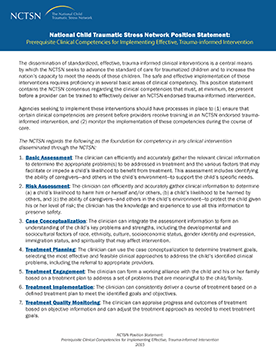
Resource Description
Guides agency leaders, clinicians, trainers, and others in optimizing service provision to children and families affected by trauma by prompting reflection on the basic clinical skills needed prior to receiving training in or implementing an evidence-based treatment (EBT).
Since the inception of the NCTSN, many EBTs for children and families exposed to traumatic life events have been developed and refined. This is a remarkable achievement in the field and has resulted in large numbers of children and their families receiving proven treatments that have helped them to move forward in their recovery. These EBTs should be implemented by well-trained clinicians who have a solid background in clinical assessment, case conceptualization, and other skill sets that increase the probability that these treatments are delivered with the highest levels of fidelity, competence, and overall quality.
In this regard, the NCTSN has developed a position statement entitled, “Prerequisite Clinical Competencies for Implementing Effective, Trauma-informed Intervention.” This position statement makes clear what basic, prerequisite competencies are required for the implementation of any EBT, both within and outside of the NCTSN.